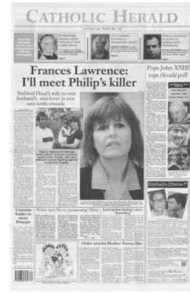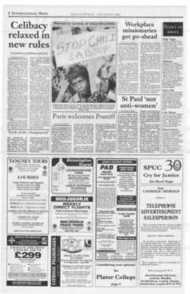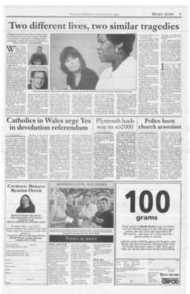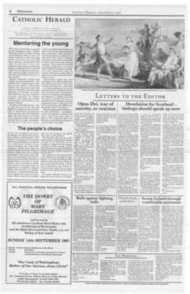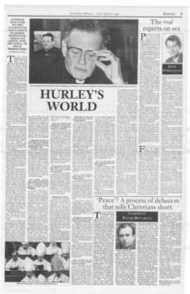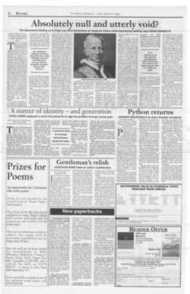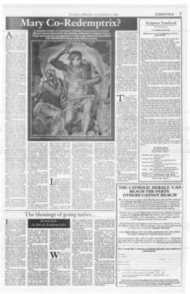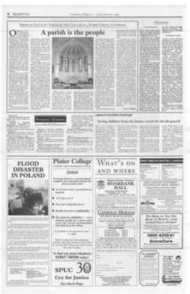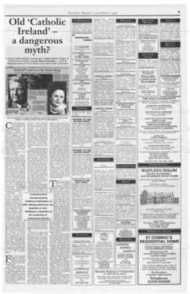Page 5, 22nd August 1997
Page 5

Report an error
Noticed an error on this page?If you've noticed an error in this article please click here to report it.
Tags
Share
Related articles
I Was Interested To Read The Interview With Archbishop Denis
Colour Bar: Bishop Protests
Hurley Mourns Paton
House Is Named After Archbishop
The Painful Transition
HURLEY'S WORLD
Archbishop Denis Hurley has been involved at first h n the greatest developments, religious and political, of the 20th century. He talks to DEBORAH JONES
THE TALL, spare, sprightly cleric who
arrived at the Herald office was none other than that distinguished giant of the Second Vatican Council, Archbishop Denis Hurley. Over 80 years, but looking 20 years younger, the Archbishop is one of the last tellers of the Council story from first hand, and I was keen to get the inside tale. He graciously needed little prodding and set to reminisce with gentle humour.
When Pope John XXIII first called his Ecumenical Council, he invited the Archbishop of Durban, South Africa, to join the central preparatory commission.
This was a painful period for Mgr Denis Hurley: "The Roman Curia was up here and we were down there. By May 1962 I was in despair. I went round all the great transalpini Cardinals: Frings of Germany, Lienart of France, Alfrink of Utrecht, and Konig in Austria, saying to them 'What are we doing? This Council is not being properly prepared; there's no proper co-ordina tion and no one is paying attention to what is being said in our meetings.' But they seemed to say 'Well, we'll just have to leave it to the Holy Spirit'."
That preparation process produced only two of the final documents: the Constitution on the Liturgy, "which was good because of the great secretary who had assembled the best liturgists from all over the Catholic world to prepare its schema (position paper)", and the Decree on Ecumenism, guided through by the Jesuit, Cardinal Bea. All the other documents had to be rewritten.
The turning point came at the end of the first period, when there was so much crit icism of the Dogmatic Constitution on the Church that the Pope scrapped the lot and ordered a brand new start. "A brave thing to do. I took up my notes recently for my memoirs and saw that I had written a huge 'At last!"
Bom in November 1915, in Cape Town, South Africa, Denis Hurley lived with his two brothers and a sister in a traditional Irish Catholic home. His deeply devout and loving mother came from a family of farriers in Skib bereen, County Cork, and his father's people were farmers nearby. To escape the farm, his father had joined the British Navy at Castle Haven and saw fairly easy action in the Boer War, as the Boers had no navy. After his service, he and his young wife became "economic migrants", settling in South Africa. His navy discipline influenced the young Hurley, strengthening him to endure the strict military-academy style rigour of the seminary of the Oblates of Mary Immaculate.
"Discipline has always been part of my life" he muses, "that's why perhaps I feel a bit 'at sea' in the modern world."
And yet he seems to be most excited by "that most revolutionary act of the Vati can Council" the Constitution Gaudium et spes (on the Church in the Modern World). All the other documents reflected theology which had been developing. But Gaudium et spes made a decisive break with the past. "Previously there had been a suspicion of all that was secu lar and worldly since the Reformation and the Enlightenment. The contrast now was with this new attitude of acceptance, of looking at the world as a place where the mystery of redemption takes place; a place to be cherished. And this caused a huge revolution for the Church which we still have not learnt to adjust to. We need to see our way into a new set of reflexes."
I asked him whether, 30 years later, we are perhaps less enchanted with the secular world. Not so in the Archbishop's view.
"Towards the end of the last century the Church had parted company with the culture of the time. In an effort to relate culture and Church Leo XIII had called in Rerum novarum for a rechristianisation of the culture. In the Council we were still taking individual aspects of the modern world and trying to christianise them, when we suddenly came to the conclusion that we'd better look at the whole lot and at what the world means to us today, the world and its culture."
But, I asked, was the fight against Modernism before the Vatican Council not a refutation of the modern world and its thinking?
"That was a moment of sheer panic," Mgr Hurley explains, "when Catholic intellectuals began to adopt the modern critical methods of historical research, scriptural research. I went to Rome just a generation after that and lived under its shadow, forever taking oaths against modernism. A useful book has been written recently about it (Critics on Trial, by Marvin R O'Connell, of Notre Dame University, 1995). This account of it is so satisfying, so enlightening. I remember that, once we got over the panic, the Vatican Council came to terms with a lot of what modernism had feared.
"I'd like to see a Council every 25 years at least, for each generation of bishops to keep up with the culture. And having Councils that often would mean that a lot of discussion would go on throughout the local Churches to prepare their bishops. The Church would also have to learn to be more honest, to talk things out openly, publicly."
Have the reforms been implemented as the Council Fathers envisaged? In liturgy, for example?
"Not all at 100 per cent. But liturgically much has been achieved. I put down what failure there's been to a failure in our seminaries. One of the great failures is that our priests haven't been trained to be good leaders of liturgy, to say the words clearly, to relate to the community, to be conscious of the community and to promote commuity particpation and the nzysterium of the particpation. Priests trained before the Council had the Latin which they just mumbled. There was no communication whatsoever in those days and the repercussions of that continue."
He should see our mailbag! What can he say to those who want to restore the Latin Mass?
"For those people worship is very personal; communication and community aren't necessary. They want the feeling of reverence that came from a foreign sacral language That's light years away from what the document on liturgy calls for a people of God, community, consciousness of community, community participation, good communication. The two are worlds apart."
And liturgy in Africa?
"In Africa there's no problem. People love community, they live community, they are community so the kind of liturgy they have now is just what they want. Although it hasn't yet all the African values, that side will have to grow as Africa matures in the Catholic faith. I exercise some pastoral ministry in the cathedral at Durban and the most exciting Mass is the Zulu Mass on a Sunday afternoon . They come from miles to be in such a big church with a great choir and they've got a good, but totally unnecessary, public address system.
When reading, they give it all they've got. Thank goodness the roof is nailed down! We have no problem, even among the English-speaking people; there's no great harking back." When did you become aware of the race situation in South Africa?
"Not when I was growing up in a totally white environment, accepting that Africa was simply colonised. Not even when I studied in Rome alongside people from Asia, especially Sri Lanka. There were no Africans in my time in Rome. No, I came to a realisation of the injustice of racialism, or ethnicism, from studying Catholic social teaching. A top-down experience. Ethnicism is one of the most ingrained social weaknesses of the whole of humanity.
In Belgium we see Walloons versus Flemish, in Canada, English-speakers versus French and vice versa, in Northern Ireland... as you know. it is a kind of corruption of the sense of community. Power for our ethnic group becomes sacred to us. There are those in South Africa who say that the blackwhite issue is just the capital-labour conflict. But it just isn't so."
Can a young African there expect to enjoy a positive future?
"Yes, mainly because people like Nelson Mandela have come across with such a forgiving, reconciling attitude. Young white male professionals are leaving South Africa to take their skills elsewhere, but eventually a balance will be achieved. It'll take a while for the white economy and black politics to fuse, maybe a generation.
"The Church there is Africanising moderately quickly. Priestly and religious vocations there are booming.Seminaries there are 90 per cent black, and Africa will soon have enough priests to begin to send them out as missionaries.
Do African women share their Western sisters' aspirations and frustrations?
"Culturally no. The majority of African women accept the position allocated to them. For example, at the cathedral when I first proposed female altar servers, it was voted down, largely by the women! Although they serve as eucharistic ministers and readers, and they lead the singing, they just don't yet feel ready to be servers.
"However, the ANC made many contacts overseas, and adopted a broader view of the role of women. There are now very many women in parliament and in positions of authority, but as yet the new assertiveness has not been felt in church life."
How involved was the Church in the struggle against apartheid?
The leadership of the Catholic and all the mainline Churches:Anglican, Methodist, and Presbyterian, but with the exception of the Dutch reformed,were strongly opposed to apartheid, but we failed to get through to the rank and file. It is, after all, so difficult for a family man to risk his job, his livelihood, by drawing attention to himself by even talking against the system. It was easier for the hierarchy and the celibate theologians to speak out.
Maybe Archbishop Tutu took an active part in bringing the two sides together, but a key role was played by the Institute for Democratic Alternative for South Africa. That arranged a meeting between white South Africans and the ANC for dialogue, not confrontation. Behind the scenes there were also talks going on. For example, for some time before Nelson Mandela was released, he had been taken from Robbin Island and installed by himself in a cottage in the grounds of a prison in Cape Town. From there he was driven by prison officers all around Cape Town for meetings and so on."
Do you see what the future of the Church in the West might be?
"Difficult to say as it is going through so many changes. The social atmosphere has little to do with God, and God's presence in the universe. The media plays a large part in that. On reading the history of the Church, it's hard to explain why, suddenly there is an upsurge through a saintly, dramatic, mystical figure raised up by the Holy Spirit. I think the same is going to happen to us.
"There was an extraordinary character who was killed in Zimbabwe towards the end of the fighting there, an officer in the Ghurka rifles, John Bradburn. He was a mystic, a poet, and worked with lepers. A Father Dove SJ, has written a life of John Bradburn and there are others who are keen to promote interest in him.
"One of my greatest inspirations was Teilhard de Chardin. I was angry when they put the 'caution' on him in 1962, so when I got the chance in the Council to give him a boost, I did. I was wondering how we could have a social teaching if we despised the world so much, when Teilhard came along with his beautiful synthesis.
"Bishop Josef Cardijn's Young Christian Worker movement was also influential. One of the first things I ever did as bishop was to send a priest to England to learn about it and pass it on to he diocese. Carcihn spoke at the Council, most eloquently. He took the theology of the Church as the Body of Christ. To my mind the growth and recovery of the theology of the mystical Body of Christ made the greatest contribution to Vatican II. It had begun around 1910, 1912 when people woke up to what St Paul had been writing about. They realised that what they had been reading for years their eyes were now opened to, that the Church is the Body of Christ. The implications of that grew and grew. The liturgical movement took it up, and the lay movements. Before that the Church had been an organisation, now it was something alive."
And one of the most alive people in it still youthfully enthusiastic and hopeful, is Archbishop Denis Hurley. Were he to live for another 82 years, he would like to be involved in education and training, to help younger generations to experience something of the fire and commitment of the Second Vatican Council.
blog comments powered by Disqus


